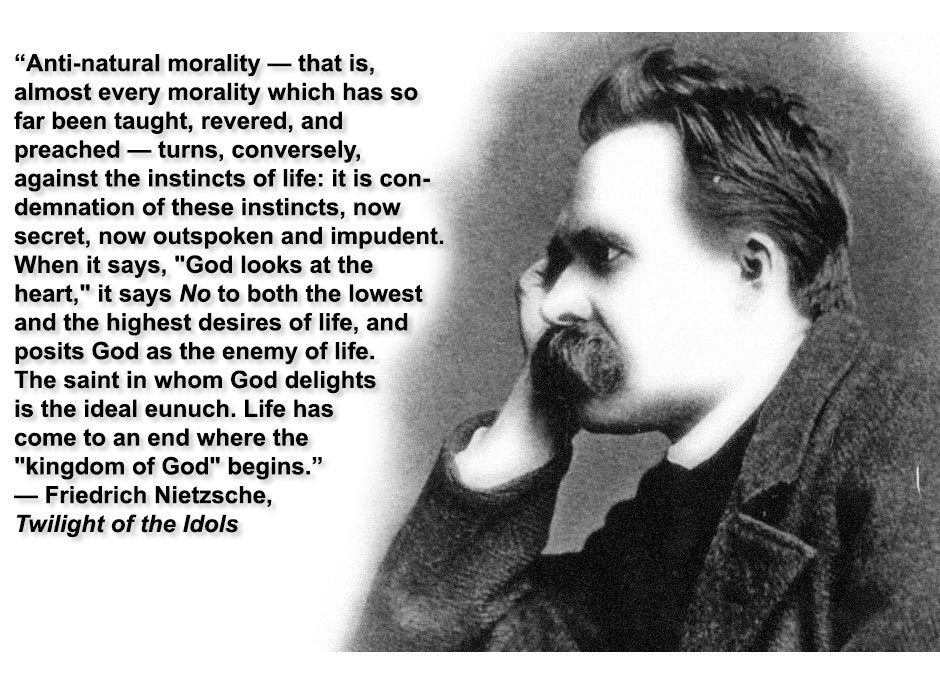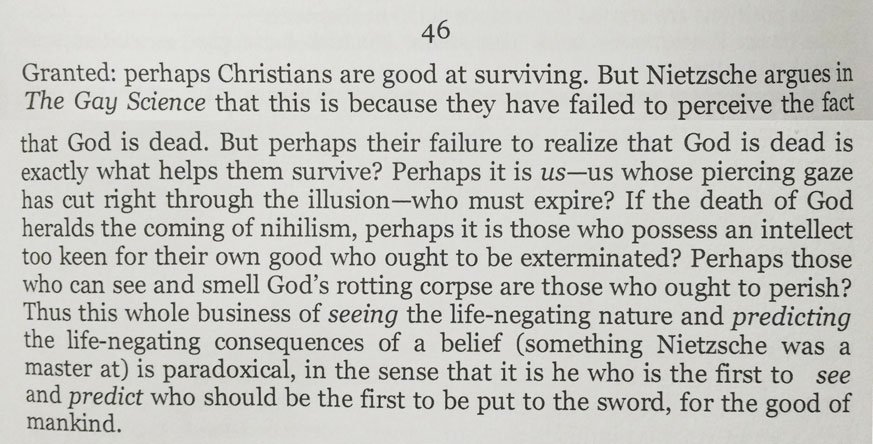Along with "cabbage-head", "nihilism" was one of Nietzsche’s top favorite cusswords. He hurled it most often, and most vehemently, against the Christian religion. To Nietzsche, Christianity is a life-negating belief system, and as such it ought to be ditched.

In my book, I wonder what Nietzsche means by "nihilistic" or "life-negating". If he's saying that Christian values oppose life, then I feel compelled to ask, "What kind of life? The contingent life we live today? Life two thousand years ago? Life two thousand years from now? Life in water? Life on land?"
What hinders survival in circumstance X (I contemplate) might aid survival in circumstance Y. I can easily imagine a great many circumstances in which Christian values promote survival. In medieval Europe, for instance, it did not pay to have a heliocentric view of the universe, to use only a stock example (favorite among us atheists). William James offered many reasons why it might pay to have Christian values (James often talked of the "cash-value" of a belief). Researchers have in recent years hypothesized and theorized on the evolutionary and psychological advantages religious faith might have conferred in the past, or continue to confer today.
So it looks like hurling the accusation of nihilism at Christians is problematic. Here are some of my other arguments against the idea that Christian values are nihilistic:
It's not currently possible to evaluate values according to their consequences
According to Nietzsche, a value or set of values is nihilistic when it leads to the species' extinction. This, however, opens Pandora's box of consequences that so troubles utilitarians. The problem is: How do we determine the consequences? It's currently practically impossible to calculate them.
For my purposes, then, since no one can accurately predict the consequences of holding on to a particular value, the truly nihilistic is simply that which negates all values: you have to lack values altogether in order to count as a nihilist in my view.
Evolution didn't eliminate Christian values
Whatever values we actually encounter in the real world, have managed to get here through the long weeding-out process called evolution. If these values have managed to survive, it is improbable that they have succeeded in doing so purely by accident: they must have, or have had, some survival benefit. It's therefore pointless to dispute the life-affirming properties of a belief, when it has proven itself against so many competitors in the merciless battlefield that is evolution. True: a belief may have conferred some evolutionary advantage in the past, but might no longer do so. But, in a changing world, we cannot predict whether a value that is today life-affirming will not become life-negating tomorrow, or vice versa. We may do well simply to take for granted the idea that all the values we hold dear today are in some degree life-enhancing.
Isn't what's true about Christian values, true about all values?
Every value is potentially nihilistic (or life-negating, to use Nietzsche's infectious term), because for every value there corresponds a possible external situation which opposes (or negates) it. And in the same way, for every value there corresponds a possible external situation which supports (or affirms) it. In other words, every value is life-negating in some possible world, and it's life-affirming in some other possible world. For example, whether you value honesty or deception, both can prove advantageous or disadvantageous in different circumstances. (This can be proven mathematically using game theory.)
What's this "possible world" nonsense? Talk to me about the real world!
I claim that a value is nihilistic only if it negates life in all possible worlds, and so I deny Nietzsche's assertion that Christian values are nihilistic. The question may be raised, however, "Is a value not nihilistic if it leads to death just in this actual world?" I believe Nietzsche would not want to say that a value can be nihilistic merely because it happens to have fatal consequences in this actual world. (In other words, I believe Nietzsche would agree with me when I say that the value of an idea cannot be reduced to its survival-value.) I can imagine a Christian fundamentalist becoming so infuriated by Nietzsche's writings that he decides to shoot him dead. Would this action make Nietzsche a nihilist, simply because his values, by being given expression through his writings, ultimately led to his death?
In the Middle Ages, it was rather difficult to be an atheist. In fact, one put his life in danger simply by virtue of being one. Does this mean that the atheists of the Middle Ages who expressed their true beliefs openly were nihilists, simply because they valued the truth over their life? What about the astronomers? Was Giordano Bruno a nihilist? What about those who put their faith in medicine, and who agreed with the then common, now disfavored, practice of bloodletting? Bloodletting, at that time, was simply the logical thing to do. Were they nihilists because they chose the logical thing to do?
Conclusion
If we deny that a value is nihilistic simply by virtue of it having fatal consequences in this actual world, then the only course that remains is that of saying that it is nihilistic if it has fatal consequences in all possible worlds, i.e. if its life-negating properties are not a consequence merely of the adverse situation in which the value happens to find itself in, but that it is necessarily life-negating. But I have argued above that this can't be said of Christian values.
Having said that, I believe what Nietzsche is arguing essentially is that Christianity has outlived its usefulness. I can't not agree with that: given the world as it is now, and the value it places on truth, Christianity can only act as an impediment to its further progress, and hence can be deemed, in a loose sense, "nihilistic".
I leave you with a phone pic of an entry from the book:

Next episode
In the next installment of the Meaning of Life series, I will examine whether it's possible to love without hating!
